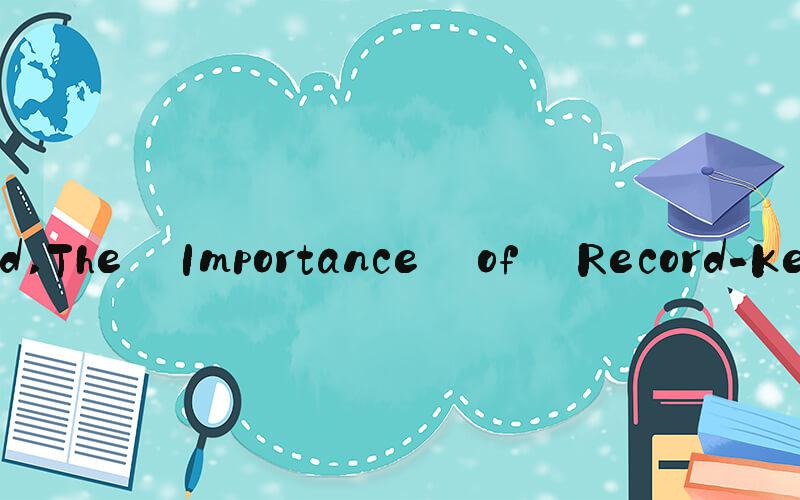AI答案
 Introduction
IntroductionAs technology has advanced rapidly in recent years, the ability to record and store information has become increasingly important. The term “record” can refer to a variety of mediums, including audio, video, and written documentation. The importance of proper record-keeping cannot be overstated in many fields, including business, medicine, and law. In this article, we will explore the significance of record-keeping and some best practices for managing records.
The Importance of Record-KeepingThere are numerous reasons why proper record-keeping is crucial in various areas of life. In the world of business, accurate and thorough records can provide insights into financial performance, help with tax filings and audits, and even serve as evidence in lawsuits. In healthcare, medical records are critical for continuity of care and for ensuring patients receive appropriate treatment. In the legal profession, records are often used as evidence in court cases or to establish the facts of a particular situation. In short, records serve as a source of truth and can be invaluable in many different settings.
Best Practices for Record-KeepingWhile the importance of record-keeping is clear, it can be challenging to know how to maintain accurate and thorough records. Below are some best practices to consider:
1. Create a Record-Keeping PolicyBefore getting started with record-keeping, it can be helpful to create a policy outlining the purpose of the records, who will be responsible for maintaining them, and how long they will be kept. This policy should take into account any legal or regulatory requirements.
2. Use a Consistent SystemUsing a consistent system for naming, filing, and storing records can help ensure they are easy to find and access when needed. It can be helpful to create a standardized naming convention and folder structure to keep things organized.
3. Train Employees on Record-Keeping ProceduresDepending on the size of your organization, it may be necessary to train employees on proper record-keeping procedures to ensure everyone is on the same page. This training should include information on what types of records need to be kept, how to handle confidential information, and how to properly dispose of records when they are no longer needed.
4. Regularly Review and Update RecordsRecords should be regularly reviewed to ensure they are accurate and up-to-date. This review process should include removing any records that are no longer necessary or relevant. It’s important to keep in mind legal requirements for retaining certain types of records when conducting these reviews.
5. Consider Using TechnologyDepending on the volume of records, it may be helpful to use technology to manage and store them. There are countless record-keeping software solutions available, ranging from simple spreadsheets to complex databases. It’s important to choose a solution that meets the specific needs of your organization.
ConclusionProper record-keeping is essential in many fields and can provide significant benefits when done correctly. By creating a record-keeping policy, using a consistent system, training employees on procedures, regularly reviewing records, and considering technological solutions, you can establish a strong record-keeping framework within your organization.
